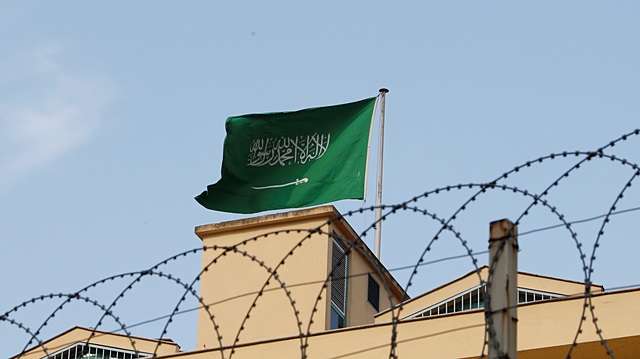

File photo: A Saudi flag flutters atop Saudi Arabia's consulate in Istanbul
'Sophisticated Saudi influence machine' faces test after Khashoggi killing, says Washington Post
Saudi Arabia's cultivated efforts to create warm relations between Riyadh and Washington is being tested amid the killing of Saudi journalist Jamal Khashoggi, The Washington Post reported Monday.
The "sophisticated Saudi influence machine" had used its wealth to funnel millions of dollars into the pockets of think tanks, law firms, consultants and defense contractors.
Saudi Arabia spent $27.3 million on lobbying efforts in the U.S. in 2017, a large increase from the $7.7 million spent in 2016, according to the newspaper.
The country also used flattery and friendliness to bring top U.S. influencers to the table, by hosting lavish galas and dinners, as well as offering Super Bowl tickets to Fox News' Bret Baier and CNN's Jake Tapper.
The Post wrote the Saudis increased lobbying efforts after the U.S. government successfully passed the Justice Against Sponsors of Terrorism Act (JASTA), which allowed families of victims of the Sept. 11 attacks to sue the government of Saudi Arabia for supporting the attacks.
"Military veterans were recruited by Saudi consultants to come to Washington to tell Congress the measure could open them up to potential litigation," the Post wrote.
Lobbying efforts led to the failure of a bill introduced in Congress which sought to end U.S. support for the Saudi-led campaign in Yemen that has led to what the UN calls "the worst humanitarian crisis in the world."
"During the seven weeks leading up to the crown prince’s visit and Yemen resolution vote, lobbyists reported 759 contacts with members of Congress, staffers, academics and reporters on behalf of the Saudi government, according to public records," the Post wrote.
The oil-rich kingdom, along with the United Arab Emirates (UAE), also invested in prominent think tanks, giving grants to the Center for Strategic and International Studies (CSIS), the Brookings Institution and the Middle East Institute (MEI).
The MEI received between $1.25 million and $4 million from the Saudis in 2016 - 2017, and also received $20 million from the UAE in 2016, the newspaper reported.
However, all three think tanks have said they are in the process of reconsidering the grants due to the "global condemnation" of the killing of Khashoggi, according to the Post.
After denying knowledge of Khashoggi's whereabouts for two weeks, Saudi Arabia on Saturday admitted the Post columnist was killed during a fight inside its Istanbul Consulate on Oct. 2.
The CSIS reportedly said it would not continue a $900,000 grant from the Saudi government, and Brookings Institute said it was closing a six-figure research granted given by the Saudis.
"For think tanks, as well as universities and museums, taking Saudi money is going to leave a stain for some time to come,” Daniel Benjamin, director of the John Sloan Dickey Center at Dartmouth University, told the Post.
#Khashoggi
#lobbying
#Saudi
#The Washington Post
#think
#UAE
#Yemen



